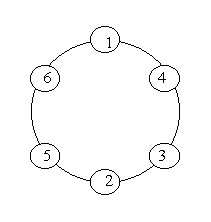Prime Ring Problem
Time Limit: 4000/2000 MS (Java/Others) Memory Limit: 65536/32768 K (Java/Others)Total Submission(s): 31783 Accepted Submission(s): 14053
Problem Description
A ring is compose of n circles as shown in diagram. Put natural number 1, 2, ..., n into each circle separately, and the sum of numbers in two adjacent circles should be a prime.
Note: the number of first circle should always be 1.

Note: the number of first circle should always be 1.

Input
n (0 < n < 20).
Output
The output format is shown as sample below. Each row represents a series of circle numbers in the ring beginning from 1 clockwisely and anticlockwisely. The order of numbers must satisfy the above requirements. Print solutions in lexicographical order.
You are to write a program that completes above process.
Print a blank line after each case.
You are to write a program that completes above process.
Print a blank line after each case.
Sample Input
6 8
Sample Output
Case 1: 1 4 3 2 5 6 1 6 5 2 3 4 Case 2: 1 2 3 8 5 6 7 4 1 2 5 8 3 4 7 6 1 4 7 6 5 8 3 2 1 6 7 4 3 8 5 2
自己独立完成的第一道深搜题,而且一遍就AC 了,哈哈。。。
#include <iostream>
#include<cstdio>
#include<cstring>
using namespace std;
int a[30];
int vis[30];
int n,num,k;
int is_prime(int x)
{
for(int i=2;i<=x/2;i++)
if(x%i==0)
return 0;
return 1;
}
void dfs(int x,int num)
{
if(num==n&&is_prime(x+1))
{
printf("%d",a[0]);
for(int i=1;i<n;i++) printf(" %d",a[i]);
printf("\n");
}
for(int i=1;i<=n;i++)
if(vis[i]==0&&is_prime(i+x))
{
a[k++]=i;
vis[i]=1;
dfs(i,num+1);
vis[i]=0;
k--;
}
}
int main()
{
int count=0;
while(scanf("%d",&n)!=EOF)
{
memset(vis,0,sizeof(vis));
a[0]=1;
vis[1]=1;
k=num=1;
printf("Case %d:\n",++count);
dfs(1,1);
printf("\n");
}
return 0;
}





















 228
228

 被折叠的 条评论
为什么被折叠?
被折叠的 条评论
为什么被折叠?








